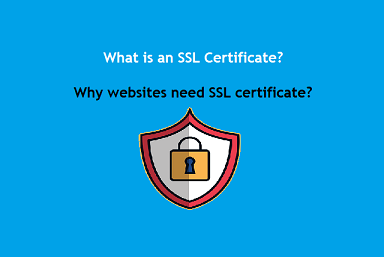What is SSL certificate?
SSL Certificate stands for Secure Socket Layer Certificate which is a certificate for security. Websites that have SSL Certificate moves from HTTP (Hypertext Transfer Protocol) to HTTPS (Hypertext Transfer Protocol Secure). HTTPS is more secure than HTTP. An SSL certificate is a data file that is hosted in a website’s origin server. SSL certificates make SSL/TLS encryption possible. SSL Certificate contains the website’s public key, identity, along with other related information. Devices that attempt to communicate with the origin server of the website will reference this file to obtain the public key and verify the server’s identity. SSL Certificate makes private key secret and secure.
What is SSL?
SSL is commonly called TLS. This is a protocol for encrypting Internet traffic and verifying server identity. Websites with HTTPS enabled web address uses SSL/TLS.
What information does an SSL certificate contain?
SSL certificate contains some data about the website. These are as under:
- The domain name for which the certificate was issued
- The name of the person, organization, or device to whom it was issued
- Which certificate authority has issued SSL Certificate
- Digital Signature of the certificate authority
- Associated subdomains, if any
- Issue date of the SSL certificate
- The expiration date of the SSL certificate
- The public key (the private key is kept a secret)
The public and private keys used for SSL are essentially long strings of characters. These are used for encrypting and decrypting data.
Why websites need SSL certificate?
After understanding the SSL Certificate it is clear that a website needs an SSL certificate to keep user data secure, verify ownership of the website. This also prevents attackers from creating a fake version of the site. The user trust more on the websites that have SSL Certificate.
How does a website obtain an SSL certificate?
SSL Certificate can be obtained from a Certificate Authority. A Certificate Authority (SSL) is an outside organization/ a trusted third party that generates and provides SSL certificates. The Certificate Authority digitally sign the certificate with his own private key allowing client devices to verify it. Some of Certificate Authorities charge a fee for issuing an SSL certificate but some are providing it free of cost.
Once the certificate is issued by the Certificate Authority then it needs to be installed and activated on the website’s origin server. Web hosting service providers usually handle this for website operators. Once SSL Certificate is activated on the origin server then the website will be able to load over HTTPS (Hypertext Transfer Protocol Secure). After enabling SSL Certificate all traffic to and from the website will be encrypted and secure.
Also Read:

